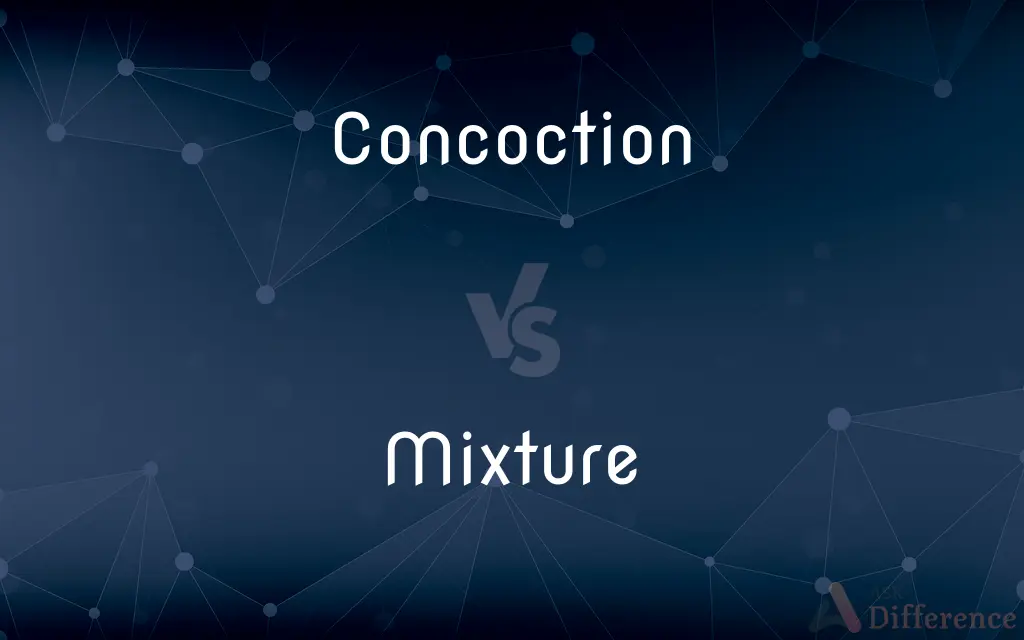Concoction vs. Mixture — What's the Difference?
Edited by Tayyaba Rehman — By Urooj Arif — Updated on March 8, 2024
A concoction often implies a creative or unusual combination, while a mixture is any blend of two or more substances.

Difference Between Concoction and Mixture
Table of Contents
ADVERTISEMENT
Key Differences
Concoction typically refers to a blend created with a sense of experimentation or inventiveness, often in the context of food, drinks, or chemicals. It suggests that the ingredients are combined in a novel or unusual way, possibly without a standard recipe or formula. On the other hand, a mixture is a more general term that denotes any combination of two or more substances, regardless of their properties, without a chemical reaction occurring between them.
The term concoction is often used in a context where the result is unique, and the process of creation involves a degree of innovation or creativity. It might be used to describe a new recipe, a homemade remedy, or a creative solution to a problem. Mixtures, however, can be found in everyday scenarios like mixing salt and water, combining metals to form an alloy, or simply mixing different fruits in a bowl.
Concoctions often carry a connotation of mystery or unpredictability in terms of their outcomes or the intentions behind their creation. This is not typically the case with mixtures, where the components and their proportions are generally known, and the result is more predictable.
In scientific contexts, the term mixture can refer to a broad range of combinations, from homogeneous mixtures like solutions, where the components are evenly distributed, to heterogeneous mixtures like suspensions, where the components are unevenly distributed. Concoctions, while they can be scientific in nature, are more often associated with less formal, more experimental processes.
Despite these differences, both terms highlight the act of combining substances. The key distinction lies in the context and connotations associated with each term: concoctions are about creativity and experimentation, while mixtures emphasize the physical act of combining without the necessity of a creative process.
ADVERTISEMENT
Comparison Chart
Implication
Creative or unusual combination
Any blend of substances
Context
Often food, drinks, or experimental blends
Broad, including scientific contexts
Connotation
Innovation, unpredictability
Standard, predictable combinations
Homogeneity
Can be either homogeneous or heterogeneous
Includes both homogeneous and heterogeneous types
Usage
More informal, often non-scientific
Formal and scientific
Compare with Definitions
Concoction
A creative or unusual mixture of various ingredients.
She delighted her guests with a concoction of exotic fruits and spices.
Mixture
A combination of two or more substances that retain their own properties.
Sand and iron filings form a simple mixture.
Concoction
A mixture made in an informal or nonstandard manner.
His homemade cough syrup was a peculiar concoction of honey and herbs.
Mixture
A blend that can be homogeneous or heterogeneous.
Air is a homogeneous mixture of gases.
Concoction
A mixture made for a specific, often novel purpose.
The inventor's latest concoction promised to clean water more efficiently.
Mixture
Something that results from the process of mixing.
The batter was a smooth mixture ready for baking.
Concoction
A term often used in a context where the mixture is ingested.
The cocktail was a potent concoction that quickly became popular.
Mixture
A term used in both everyday and scientific language.
The recipe called for a mixture of flour and water.
Concoction
An experimental blend, possibly with uncertain outcomes.
The chemist tested a new concoction to observe its reaction.
Mixture
A term that does not imply a reaction between components.
A mixture of oil and vinegar can be used as a salad dressing.
Concoction
Concoction is the process of preparing a medicine, food or other substance out of many ingredients, and also the result of such a process. Historically, the word referred to digestion, as conceived by Aristotle who theorized that this was the result of the heat of the body acting upon the material, causing it to mature and ripen.The term later came to refer to liquid broths, cocktails and potions which are similarly formed by heating or blending multiple ingredients.
Mixture
In chemistry, a mixture is a material made up of two or more different substances which are not chemically combined. A mixture is the physical combination of two or more substances in which the identities are retained and are mixed in the form of solutions, suspensions and colloids.Mixtures are one product of mechanically blending or mixing chemical substances such as elements and compounds, without chemical bonding or other chemical change, so that each ingredient substance retains its own chemical properties and makeup.
Concoction
To prepare by mixing ingredients, as in cooking.
Mixture
The act or process of mixing
An alloy made from the mixture of two metals.
Concoction
To devise, using skill and intelligence; contrive
Concoct a plan.
Mixture
The condition of being mixed
The inevitable mixture of different cultures in big cities.
Concoction
The preparing of a medicine, food or other substance out of many ingredients.
Mixture
A combination of ingredients used in cooking or baking.
Concoction
A mixture prepared in such a way.
Mixture
One that consists of diverse elements
The day was a mixture of sun and clouds.
Concoction
Something made up, an invention.
Mixture
A fabric made of different kinds of thread or yarn.
Concoction
(obsolete) Digestion (of food etc.).
Mixture
(Chemistry) A composition of two or more substances that are not chemically combined with each other and are capable of being separated.
Concoction
The act of digesting in the mind; rumination.
Mixture
The act of mixing.
The mixture of sulphuric acid and water produces heat.
Concoction
Abatement of a morbid process, such as fever, and return to a normal condition.
Mixture
Something produced by mixing.
An alloy is a mixture of two metals.
Concoction
(obsolete) The act of perfecting or maturing.
Mixture
Something that consists of diverse elements.
The day was a mixture of sunshine and showers.
Concoction
A change in food produced by the organs of nutrition; digestion.
Mixture
A medicinal compound, typically a suspension of a solid in a solution
A teaspoonful of the mixture to be taken three times daily after meals
Concoction
The act of concocting or preparing by combining different ingredients; also, the food or compound thus prepared.
Mixture
(music) A compound organ stop.
Concoction
The act of digesting in the mind; planning or devising; rumination.
Mixture
A cloth of variegated colouring.
Concoction
Abatement of a morbid process, as a fever and return to a normal condition.
Mixture
(India) A mix of different dry foods as a snack, especially chevda or Bombay mix.
Concoction
The act of perfecting or maturing.
Mixture
The act of mixing, or the state of being mixed; as, made by a mixture of ingredients.
Concoction
Any foodstuff made by combining different ingredients;
He volunteered to taste her latest concoction
He drank a mixture of beer and lemonade
Mixture
That which results from mixing different ingredients together; a compound; as, to drink a mixture of molasses and water; - also, a medley.
There is also a mixture of good and evil wisely distributed by God, to serve the ends of his providence.
Concoction
An occurrence of an unusual mixture;
It suddenly spewed out a thick green concoction
Mixture
An ingredient entering into a mixed mass; an additional ingredient.
Cicero doubts whether it were possible for a community to exist that had not a prevailing mixture of piety in its constitution.
Concoction
The invention of a scheme or story to suit some purpose;
His testimony was a concoction
She has no peer in the concoction of mystery stories
Mixture
A kind of liquid medicine made up of many ingredients; esp., as opposed to solution, a liquid preparation in which the solid ingredients are not completely dissolved.
Concoction
The act of creating something (a medicine or drink or soup etc.) by compounding or mixing a variety of components
Mixture
A mass of two or more ingredients, the particles of which are separable, independent, and uncompounded with each other, no matter how thoroughly and finely commingled; - contrasted with a compound and solution; thus, gunpowder is a mechanical mixture of carbon, sulphur, and niter.
Mixture
An organ stop, comprising from two to five ranges of pipes, used only in combination with the foundation and compound stops; - called also furniture stop. It consists of high harmonics, or overtones, of the ground tone.
Mixture
(chemistry) a substance consisting of two or more substances mixed together (not in fixed proportions and not with chemical bonding)
Mixture
Any foodstuff made by combining different ingredients;
He volunteered to taste her latest concoction
He drank a mixture of beer and lemonade
Mixture
A collection containing a variety of sorts of things;
A great assortment of cars was on display
He had a variety of disorders
A veritable smorgasbord of religions
Mixture
An event that combines things in a mixture;
A gradual mixture of cultures
Mixture
The act of mixing together;
Paste made by a mix of flour and water
The mixing of sound channels in the recording studio
Common Curiosities
Can a mixture become a concoction?
Yes, a mixture can be considered a concoction if it involves a creative or novel combination of ingredients, especially in a non-standard or experimental context.
Is every concoction a mixture?
Yes, every concoction is a type of mixture, but not all mixtures are concoctions due to the creative or experimental connotations of the latter.
What defines a concoction?
A concoction is defined by its creative or unusual blending of ingredients, often with an element of experimentation or novelty.
Are concoctions always safe to consume?
Not necessarily; since concoctions can involve unusual or experimental combinations, their safety can vary and should be assessed based on the ingredients and methods used.
How do I separate a mixture into its components?
Separation techniques depend on the properties of the components, including filtration, distillation, evaporation, and magnetic separation, among others.
Can a concoction be a homogeneous mixture?
Yes, a concoction can be homogeneous if the ingredients are completely blended, although the term often implies a more complex or unusual blend.
What's the significance of understanding mixtures and concoctions?
Understanding these concepts is crucial in fields like chemistry, cooking, pharmacology, and materials science, where combining substances in various ways can lead to new discoveries, products, and culinary creations.
How do I know if something is a mixture or a concoction?
The distinction often lies in the context and the intent behind the combination; concoctions are associated with creativity and experimentation, while mixtures refer to the general act of combining substances.
Can mixtures react chemically?
Mixtures themselves do not react chemically, but individual components within a mixture can react with each other under certain conditions.
What role do mixtures play in science?
Mixtures are fundamental in various scientific fields, serving as the basis for numerous experiments, studies, and industrial processes.
Share Your Discovery

Previous Comparison
Werewolf vs. Wendigo
Next Comparison
Help vs. SupportAuthor Spotlight
Written by
Urooj ArifUrooj is a skilled content writer at Ask Difference, known for her exceptional ability to simplify complex topics into engaging and informative content. With a passion for research and a flair for clear, concise writing, she consistently delivers articles that resonate with our diverse audience.
Edited by
Tayyaba RehmanTayyaba Rehman is a distinguished writer, currently serving as a primary contributor to askdifference.com. As a researcher in semantics and etymology, Tayyaba's passion for the complexity of languages and their distinctions has found a perfect home on the platform. Tayyaba delves into the intricacies of language, distinguishing between commonly confused words and phrases, thereby providing clarity for readers worldwide.













































